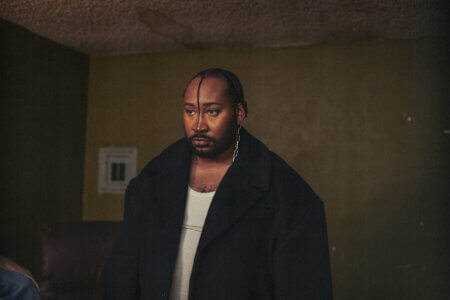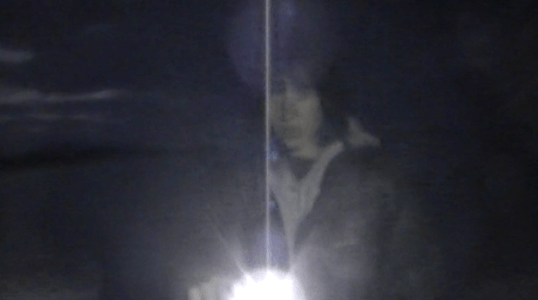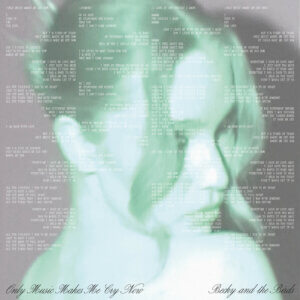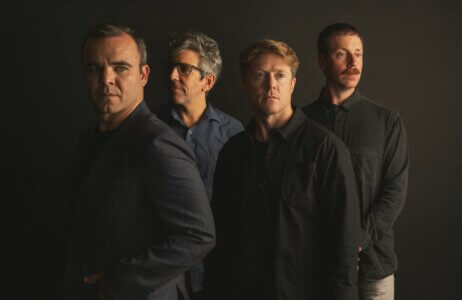Buck Meek Gets Inspired In Many Places
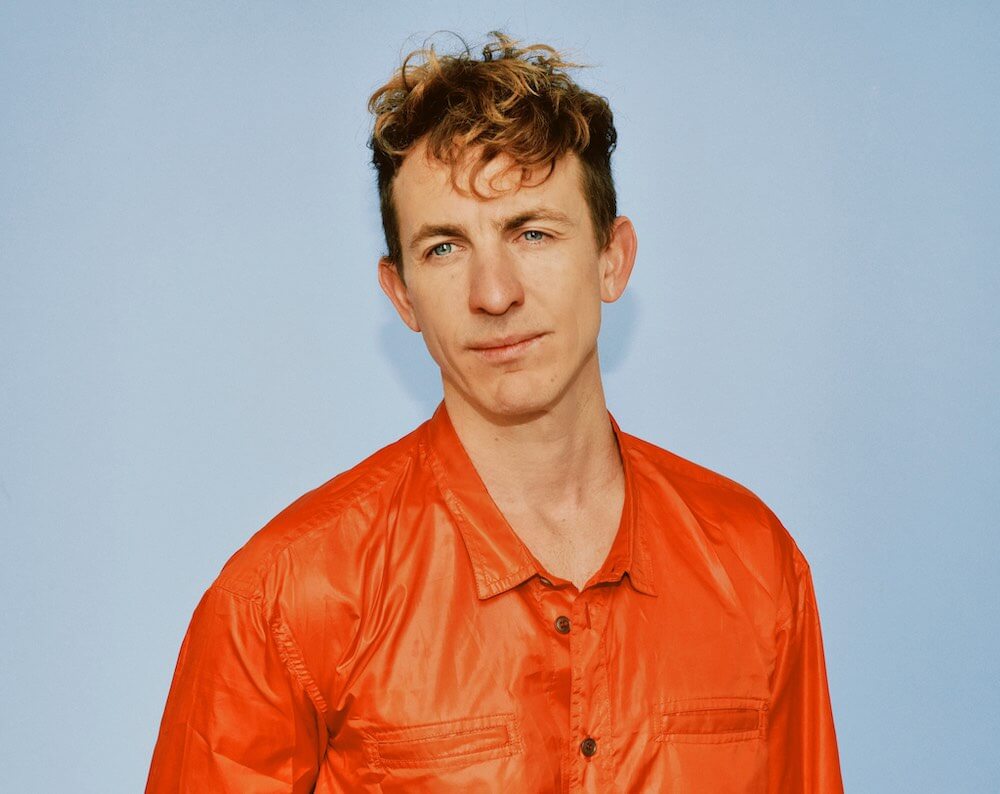
There’s a naturalistic element to Buck Meek’s music, similar to early morning strolls through a peaceful underbrush as the sun slowly pokes through the leaves. It can feel like that first crisp inhale of autumn, the promise of change. Place is indelibly linked to Buck Meek’s newest album, Haunted Mountain.
Written on the road, from the Serra de Estrela Mountains in Portugal to the submerged volcano of Milos in the Cyclades, many of the songs exude a hopefulness and earnestness that come from a place of deep vulnerability. Thematically, Haunted Mountain delves deep into the realm of love, shedding light on our interconnected experiences with one another, our surroundings, and the enigmatic cosmic unknown that inspires awe. From the soft, rolling waves of melody that float along peacefully on songs like ‘Secret Side and ‘Haunted Mountain,’’ to the sharp pangs of steel guitar on a song like ‘Cyclades,’ Haunted Mountain yearns for something both overwhelming and familiar. Northern Transmissions caught up with Buck Meek while on tour to discuss his relationship to myth, place and why the best love songs are always the simplest.
Northern Transmissions: Firstly, congratulations – the album has been out for just over a week. How does your relationship to finished pieces and work change over time?
Buck Meek: Well, I don’t look back too much to be honest. I think once the album is finished recording, it takes a lot of thought and work to prepare it for bringing [it] into the world. To think about the mixes and the masters and the sequence and the artwork and the credits and everything around the language. I’ve learned over the years of making records that most journalists blatantly plagiarize the bio, so I’ve learned to put a lot of thought into [it].
There’s a lot of planning that goes into everything around the album for six months or so. Once the album is finally out, there’s a breath and that’s when I feel like I can finally start focusing on the next one.
NT: And similarly, how have you found that certain songs change in a live setting over time?
BM: Hm, good question. The songs that I think I’ve written more intuitively, I think the more I write, the more I trust my intuition and try to write quickly and allow myself to kind of move out of the way and just try to write to my more subconscious place.
And with that, to some degree, comes more oblique language. I think those songs especially tend to evolve in meaning for me over time as life goes on. I can look back and like, see more into my younger subconscious as I learn more about myself.
NT: So then would some songs sort of reveal things about you in your past that you didn’t really anticipate discovering?
BM: I think so, yeah.
NT: This album was written physically in multiple places, from Portugal to the Swiss Alps to Milos, Cyclades. What is your relationship to place as it affects your songwriting process?
BM: Definitely. I mean, yeah, I think place is really impactful for our mental state. We’re such – at least I am – such a product of nurture. But in songwriting as kind of like a device, I think I use place to kind of reflect this phenomenon that I find in emotion where I think at least my experience of emotion is that it often kind of charges or animates my environment and kind of brings life to whatever inanimate objects I’m with at the time. Then that can attach itself to memory.
So I guess I use that in songwriting to some degree, often I’ll just write observationally and trust that the emotion will be inferred or maybe even leave space for the listener to animate the inanimate in my song with their own emotion.
NT: Has the process of writing this specific album changed your relationship with myth and personal/familial history?
BM: I could probably answer that question in so many ways if I went through all the songs, but the first one that comes to mind is ‘Lullabies,’ which is a song I wrote in the attempt of understanding the sacrifice of a mother giving birth to a son and the joy and the unrequited-ness of giving birth, raising a child and letting them go into the world and the unconditional love that, that is required for that.
I mean I can only imagine to some degree but I think I learned a lot about my own mother and grandmother and my history. I felt like I only had so much capacity to write that song, so I asked my friend, Jolie Holland, to help me. She contributed the second and third verse with the second verse kind of inspired by a ritual that she knew, where the midwife comes to the birth and unties all the curtains, all the braids, all the knots in the room just to make space for the birth. And so that I think felt like a key that helped unlock the song.
NT: When it comes to love songs, you mentioned that “Sometimes it can feel like all the great love songs have already been written.” Can you share a love song that never fails to capture your heart and attention?
BM: Well, often the simplest ones. There’s something about just the simplest love songs that can say so much. Guy Clark’s ‘Anyhow I Love You’ is the love song that always hits me really hard.
NT: How has your relationship to touring and audiences changed post COVID?
BM: Oh yeah, and this tour has been really special for me because we started the tour before the album was released. There were a few songs out in the world, then the album came out about halfway through. It’s been really beautiful to see people start to get to know the songs as we move from town to town. There’s a very different feeling when you play a song on stage to people who have heard the song before versus people who have, you know, people who haven’t heard the song.
There’s this like familiarity, this feeling of kinship, I think that comes from just that mutual understanding. I’m really grateful for the community that, to a huge degree, Big Thief has cultivated and also that I’ve been trying to cultivate for my own music.
I think for the last 10 years, both Big Thief and my project have always just played new material as soon as it comes.We’ve kind of like we’ve developed that expectation with the people that come to our shows. And so they’re really open to it, which I know is a gift.
NT: Are there any songs you’re particularly excited to play out on this tour?
BM: Oh, probably all of them. I’ve really been enjoying starting to play ‘Didn’t Know You Then.’ That song’s actually been kind of tough for me to pull off with the band. I’s the most earnest love song I’ve ever written and there’s something really vulnerable about playing that.
The song actually came from an exercise In this songwriting class that Luke Temple taught through the School of Song. Which is this awesome website that my friend Steven van Betten and Blue Shepherd built. Luke taught this class about the romantic love song. He gave us a list of cliches and I chose “I’m nothing without you” and I wrote the melody to “Didn’t Know You Then” with different lyrics.
And I wrote it as a joke, as an exercise for this workshop but then I sang it for my lady, and she just turned bright red and loved it. It felt so good to sing, like there was something about the intention of it. It’s hard to sing in front of a group of people, so I’ve been trying to sing that every night.
NT: What’s your take on what makes a collaboration really work?
BM: I think there’s a balance required in collaboration where both parties are really stepping forward confidently with their ideas, you know? And trying to move the collaboration along and give the collaboration a spine while also somehow remaining really sensitive and empathetic to the other.It takes a lot of patience, but also bravery and it’s really vulnerable in both directions. It’s vulnerable to be confident in front of someone, especially someone who you respect, and it’s vulnerable to listen and to be open. I Really value that attempt though, I think it’s a beautiful way to deepen a friendship.
Order Haunted Mountain by Buck Meek HERE
Latest Reviews
Tracks
Advertisement
Looking for something new to listen to?
Sign up to our all-new newsletter for top-notch reviews, news, videos and playlists.





